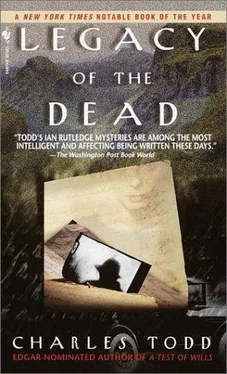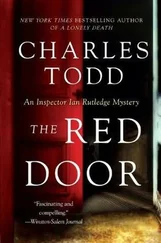Charles Todd - Legacy of the Dead
Здесь есть возможность читать онлайн «Charles Todd - Legacy of the Dead» весь текст электронной книги совершенно бесплатно (целиком полную версию без сокращений). В некоторых случаях можно слушать аудио, скачать через торрент в формате fb2 и присутствует краткое содержание. Жанр: Полицейский детектив, на английском языке. Описание произведения, (предисловие) а так же отзывы посетителей доступны на портале библиотеки ЛибКат.
- Название:Legacy of the Dead
- Автор:
- Жанр:
- Год:неизвестен
- ISBN:нет данных
- Рейтинг книги:5 / 5. Голосов: 1
-
Избранное:Добавить в избранное
- Отзывы:
-
Ваша оценка:
- 100
- 1
- 2
- 3
- 4
- 5
Legacy of the Dead: краткое содержание, описание и аннотация
Предлагаем к чтению аннотацию, описание, краткое содержание или предисловие (зависит от того, что написал сам автор книги «Legacy of the Dead»). Если вы не нашли необходимую информацию о книге — напишите в комментариях, мы постараемся отыскать её.
Legacy of the Dead — читать онлайн бесплатно полную книгу (весь текст) целиком
Ниже представлен текст книги, разбитый по страницам. Система сохранения места последней прочитанной страницы, позволяет с удобством читать онлайн бесплатно книгу «Legacy of the Dead», без необходимости каждый раз заново искать на чём Вы остановились. Поставьте закладку, и сможете в любой момент перейти на страницу, на которой закончили чтение.
Интервал:
Закладка:
“Who’s to say that in the end those bones are no’ their own mystery-and no’ ours?” Hamish countered stubbornly.
“Then you’d better pray that Eleanor Gray left the child with Fiona while she secretly went off to finish her studies. It’s the only way to convince Inspector Oliver that he’s got no case. Which brings me back to what I’ve been saying all along. Right now Eleanor Gray is the key to the investigation.”
“I canna’ say I like it!”
It was odd, Rutledge found himself thinking at one point, how Hamish had coped with the unexpected and sudden confrontation with Fiona MacDonald. He was vigorous in her defense, and he had never questioned her innocence. But far deeper than that ran the knowledge that her life now was separating from his. Not as Jean had left him, wanting to be free of what she feared, but in the very fact that living had drawn Fiona into new directions and new feelings and new places that Hamish would never share. He had not known about Duncarrick; he had not known about the child. The silences that followed his meeting Fiona again had been a painful reminder that time did not wait, that there was no holding on to it. That there was an emptiness in death. And yet in some sense, it was as if she was the one who had died, for Hamish mourned her loss with a heavy sorrow, with yearning and despair. And the burden Rutledge carried grew daily heavier with it.
It was Rutledge who struggled with the reality, the fact that Fiona could be found guilty of murder and hanged. He was the one who dealt with the tired face and dark-circled eyes of the woman in the cell. It was Rutledge who bore the brunt of fear and uncertainty about his own views of the evidence and the case building so tightly. Uncertainty, too, about his personal feelings.
He had seen Fiona through Hamish’s eyes for so long that until now she had seemed rather like the Dresden figurines on Frances’s bookshelf-gentle and uncomplicated, frozen in time and place, mourning her dead soldier. A woman wronged by what he, Rutledge, had been forced to do on the battlefield. The martyr, as it were, to his own guilt. Even in the dream in London she had been connected to the death of Hamish, with no existence all her own.
He had, he realized suddenly, seen her through Hamish’s memories.
Now he had his own.
A flesh-and-blood woman, somehow attractive and, right or wrong, displaying remarkable strength in her lonely defiance of the law. Mourning Hamish still and giving that pent-up love to a child… The courage of innocence-or guilt? Rutledge found that she had brought out the protective streak in him, and he couldn’t be sure whether it was for her own sake or Hamish’s that he felt bound to do his best for her.
There was confusion and emotion in his mind fraught with his own bitterness, his own loneliness. It was, he thought, forcing him to think without the clarity and objectivity he tried to bring to every investigation assigned to him.
Hamish, God damn it, was right “And where was your objectivity in Cornwall-or Dorset?” Hamish demanded. “Where was your clarity then? Those women touched you too. How can you be sure it is Fiona and not you who’s on trial here!”
Rutledge had no answer.
Rutledge stopped in Winchester long enough to bathe and change his clothes and then found his way to Atwood House.
It was a small manor house built of mellow stone by a sure hand in the 1700s. The architect had set it on a knoll that offered splendid views to the south and an old grove of trees to the north, offering privacy and a barrier against cold winds. A stream meandering through the property was lined with wild roses, thick with hips now. Rutledge could see a pair of swans swimming regally on a pond created for the rowboat tied to a post. Someone had opened out the stream to fill the pond, and created a lovely effect at the bottom of the western gardens, a mirror of the sky that barely rippled as the swans floated above their own images.
The drive swept him up to the Georgian front with its dressed stone and pedimented windows. He got out of the car, nodding to the gardener trundling a handbarrow filled with spades and hoes and trimmers across the lawn toward the drive, and walked to the door. A brass knocker, which looked to be a more modern copy of an earlier iron one, clanged mightily as he let it fall.
After a proper passage of time, an elderly butler answered the door.
Rutledge identified himself and asked to speak to Mrs. Atwood.
The butler, noting his crisp collar and the set of his suit across his shoulders, said, “I’ll ask if Mrs. Atwood is at home this afternoon.”
He led Rutledge to a coldly formal room and left him there for nearly seven minutes. The walls, sheathed in blue silk, shimmered in the light from the long windows, and the French chairs that set off the white marble of the mantel were arranged for elegance, not comfortable conversation. There was no carpet on the floor, and on closer inspection, the walls as well as the fabric covering the chairs were worn. But over the mantel was a wonderful painting of the view he’d seen coming up the drive. It was a younger time, the trees were not yet mature, there were sheep grazing the smooth lawns, and the house did not have the patina of age, but the serenity was there, unchanged.
The butler returned and conducted him down the passage to a sitting room that also showed wear. Well-worn chintz, a faded carpet on which an elderly spaniel slept noisily, and an air of comfortable, genteel shabbiness told him that the house had suffered much use during the war and had not yet reclaimed its former elegance. But the windows faced the pond and the stream, framing the view and bringing in the soft light of afternoon. It was peaceful.
Mrs. Atwood was standing by the empty hearth as he came in. A pale woman in every sense, slim and willowy in pastel green, pale of hair and eyes and skin, as if all the color had been washed away in the long, careful years of family breeding.
He discovered very quickly that the character had not been washed away.
She said with graciousness that was backed by steel, “I have spoken to-um-a Sergeant Gibson. There is nothing more I wish to say to the police.”
“That’s quite possible,” he answered. “Sergeant Gibson was here as a duty. I have come as an emissary of Lady Maude Gray.”
Something unexpected stirred in the pale blue eyes. They were the color of faded lupines, hardly differentiated from the white surrounding them. “I have not heard from Lady Maude in some years.” Her voice was neutral, giving nothing away.
Hamish, silent until now in the shadows of Rutledge’s mind, said softly, “She doesna’ care for yon Lady Maude… ”
Making a note of it, Rutledge answered, “It isn’t surprising. She quarreled with her daughter. I cannot say she regrets that quarrel, but she has come into information now that has disturbed her. It’s very possible that Eleanor Gray is dead. How and where she came to die we don’t know. I am doing what I can to find answers.”
Surprise flared in the long face. “Dead! But your sergeant-”
“-said nothing about that. Yes, I know. On my instructions.”
He let the silence fall and gave her time to digest his curt answer.
“I don’t see how I can help you. I haven’t seen Eleanor since the middle of the war. I thought-Humphrey and I were quite convinced she’d gone to America when she couldn’t take up medicine here. It would have been so like her!”
“Why should she choose to go there? Did she have friends-someone who might put in a word for her?”
“As a matter of fact, there was someone.” She hesitated and then added, “I called Alice Morton after Sergeant Gibson left. She was in school with Eleanor and me. But her husband is an American-he’s at the embassy here. His brother John is a professor at Harvard. He’d written to Eleanor once, in the spring of 1916, at Alice’s request, laying out opportunities she might wish to consider over there. Alice told me John had never had a reply. Eleanor hadn’t contacted him at all.” Mrs. Atwood shrugged lightly. “She was always strong-minded. She might not have wished to be beholden, even to a friend.”
Читать дальшеИнтервал:
Закладка:
Похожие книги на «Legacy of the Dead»
Представляем Вашему вниманию похожие книги на «Legacy of the Dead» списком для выбора. Мы отобрали схожую по названию и смыслу литературу в надежде предоставить читателям больше вариантов отыскать новые, интересные, ещё непрочитанные произведения.
Обсуждение, отзывы о книге «Legacy of the Dead» и просто собственные мнения читателей. Оставьте ваши комментарии, напишите, что Вы думаете о произведении, его смысле или главных героях. Укажите что конкретно понравилось, а что нет, и почему Вы так считаете.












